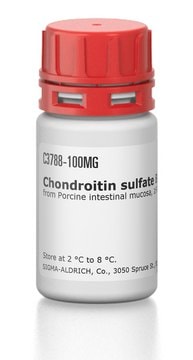H9395
α-Hemolysin from Staphylococcus aureus
lyophilized powder, Protein ~60 % by Lowry, ≥10,000 units/mg protein
Sinónimos:
α-Toxin
About This Item
Productos recomendados
biological source
Staphylococcus aureus
Quality Level
form
lyophilized powder
specific activity
≥10,000 units/mg protein
contains
sodium citrate buffer as balance
composition
Protein, ~60% Lowry
solubility
H2O: soluble 0.49-0.51 mg/mL
UniProt accession no.
storage temp.
2-8°C
Gene Information
Staphylococcus aureus ... SAOUHSC_01121(3920722)
Categorías relacionadas
General description
Application
- as a component of electrolyte solution for testing pore formation in lipid bilayer using electrophysiological measurements
- to test its osteogenesis suppressive effects in bone marrow stromal cells (BMSCs)
- in the preparation of α-hemolysin molecular imprinted polymer (MIP) for Biacore and surface plasmon resonance
Biochem/physiol Actions
Packaging
Unit Definition
signalword
Warning
hcodes
Hazard Classifications
Eye Irrit. 2 - Skin Irrit. 2 - STOT SE 2
target_organs
Lungs,Blood
Storage Class
11 - Combustible Solids
wgk_germany
WGK 3
flash_point_f
Not applicable
flash_point_c
Not applicable
ppe
Eyeshields, Gloves, type N95 (US)
Certificados de análisis (COA)
Busque Certificados de análisis (COA) introduciendo el número de lote del producto. Los números de lote se encuentran en la etiqueta del producto después de las palabras «Lot» o «Batch»
¿Ya tiene este producto?
Encuentre la documentación para los productos que ha comprado recientemente en la Biblioteca de documentos.
Contenido relacionado
Visión general de los métodos de lisis celular y extracción de proteínas: solubilización con detergente, lisis mediante congelación-descongelación, choque osmótico, tratamiento con ultrasonidos, lisis celular enzimática y técnicas de alteración mecánica como la homogeneización con Dounce, Polytron y con mortero y almirez.
Cell lysis and protein extraction methods overview various techniques, from detergent solubilization to mechanical disruption, supporting research needs.
Nuestro equipo de científicos tiene experiencia en todas las áreas de investigación: Ciencias de la vida, Ciencia de los materiales, Síntesis química, Cromatografía, Analítica y muchas otras.
Póngase en contacto con el Servicio técnico










